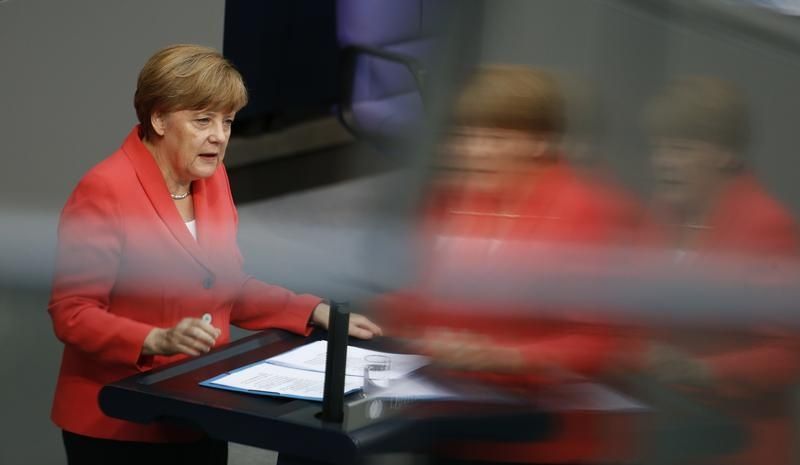This article was originally published by the Official Monetary and Financial Institutions Forum (OMFIF) in the The OMFIF Commentary.
After 10 years in office in 1989, the sun began to set on Margaret Thatcher’s reign at 10 Downing Street. There was plenty of evidence – not least in her far-from-secure handling of German unification – that she was losing her grip. Now, a decade after her chancellorship started in 2005, something similar is happening with Angela Merkel: we are witnessing the waning of Europe’s pivotal politician.
Both periods were marked by large-scale movements of people into the prosperous parts of Germany. In 1989, around 20,000 dissatisfied East Germans a month were streaming into West Germany – inflows that forced Chancellor Helmut Kohl to bring the D-mark into East Germany prematurely as a prelude to full-scale unification.
More than a quarter of a century later, the same numbers are journeying into Germany within a single weekend – this time, displaced migrants from conflict-torn areas of the Middle East, Asia and Africa. The latest estimate of the human flows for the whole year is 1.5m – nearly double the 800,000 forecast earlier this summer – placing unprecedented burdens on policing, the social services, and ultimately the political calculations and machinery behind Merkel’s chancellorship.
For some time to come, Merkel can continue to be the No. 1 personality on the German and European political stage. In the corridors of the chancellery, there is no Brutus, no Cassius; no heir apparent waiting in the wings. But her popularity in Germany, which has been stable over the best part of a decade, is now fading. Even her support among the party rank and file is no longer what it used to be. ‘Merkelomania’ can reach a tipping point more or less overnight, once the chancellor is perceived as a part of the problem rather than a key to the solution.
All of this has big implications for Europe. Just as the Volkswagen diesel-technology debacle has severely dented the country’s industrial credibility, the refugee crisis has exerted similar damage to Merkel’s stature. The issue towers over the German political debate, dominating every dinner table between the North Sea and the Alps.
Leadership of the euro will be fragile in coming months, just as the single currency faces new tests over Greek debt restructuring. French President François Hollande and Italian Prime Minister Matteo Renzi will gleefully exploit Germany’s diminished influence over holding down budget deficits. Merkel will have less room to broker deals over British membership of the European Union, increasing the likelihood of a UK exit many Germans regard with great distaste.
A renascent China, as well as a new American administration after the January change of presidency, may well believe it has no real European partner – and not for the first time. Merkel’s well-intentioned but ill-thought-through public statements about Willkommenskultur (a culture of welcoming), and the accompanying hype among the faithful in her Christian Democrat party, are not shared by a growing numbers of ordinary voters. This is not only in Bavaria, in the south of Germany – first in line to face the migrants – but also in the country at large.
Hundreds of thousands of angry young men from outside Germany – many of them with no links whatsoever to the country beyond their knowledge that it is relatively rich and (for reasons linked to the Nazi past) tolerant of immigration – insist on their right to travel to Germany. After all, the most powerful woman on earth has promised it to them. Certainly, the Germans see waves of human misery beset by horrendous hardship, yet many are now telling their political leaders that charity begins at home.
Every barracks, freshly vacated by the German military, is filled with refugees. With every unused school building occupied and empty private housing sequestered, things begin to look distinctly uncomfortable to hosts who were not asked how far they would extend a helping hand.
There is a maze of difficulties. The politicians conveniently ignored early warnings from the top echelons of the federal police. To address them before their time would have been contrary to Merkel’s style of running the show. As early as March 2015, the police predicted 1m refugees, mostly from Syria, before the end of the year. But police chiefs suffered the same fate as Cassandra: knowing the future, but never being listened to.
Germany failed to make sufficient preparations for the inflows, even after the first four years of the Syrian agony. In all areas – accommodation, languages, schooling and training of skilled personnel – the country is facing great difficulties in coping with the challenges. Communication in foreign languages is problematic, if not frequently impossible. Police forces have been pared down over the past decade and hospitals are now overflowing, meaning adequate health checks on the new arrivals are out of the question.
In Germany, of all places, the sheer momentum of the migrant flows has exposed the vulnerability and inadequacy of the welfare state. What the state owes its own citizens – but not the rest of the world – is the protection of life, liberty and estate. The German social contract, so comfortably furnished with every imaginable benefit, has been suddenly laid bare in its essence. The results, for Merkel, Germany and Europe, will be disquieting.
(Part 2 of ‘The waning of Merkel’ will appear as an OMFIF Commentary tomorrow).
Michael Stürmer is chief correspondent of Die Welt, a former adviser to Chancellor Helmut Kohl and a member of the OMFIF Advisory Board.
